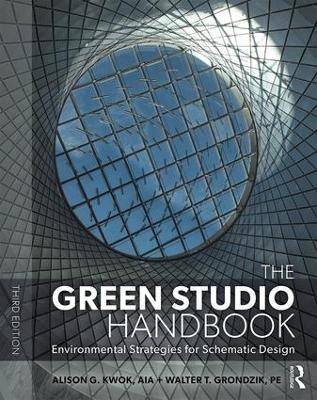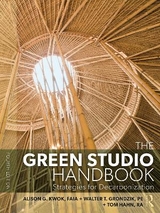
The Green Studio Handbook
Routledge (Verlag)
978-1-138-65229-3 (ISBN)
The Green Studio Handbook remains an essential resource for design studios and professional practice. This extensive and user-friendly tool presents practical guidelines for the application of green strategies during the schematic design of buildings. Students and professionals can quickly get up to speed on system viability and sizing. Each of forty-three environmental strategies includes a brief description of principles and concepts, step-by-step guidance for integrating the strategy during the early stages of design, annotated tables and charts to assist with preliminary sizing, key issues to consider when implementing the strategy, and pointers to further resources. Ten new in-depth case studies illustrate diverse and successful green buildings integrated design projects and how the whole process comes together This third edition features updated tables and charts that will help to save energy, water, and material resources during the early stages of design. More than 500 sketches and full-color images illustrate how to successfully apply strategies. A glossary, a project index listing 105 buildings in 20 countries, updated tables and drawings, and I-P and SI units increase the usefulness of The Green Studio Handbook.
Alison G. Kwok, Ph.D., AIA, LEED-AP, ASES Fellow, is a registered architect and a professor of architecture at the University of Oregon. She has also taught in architecture programs in California, Hawaii, Hong Kong, Japan, Korea, and New York. Walter Grondzik, PE, LEED-AP, ASES and ASHRAE Fellow, is an architectural engineer and a professor of architecture at Ball State University. He has also taught in architecture and architectural engineering programs in Florida, Oklahoma, Oregon, and Saudi Arabia.
Acknowledgments
Preface
CHAPTER 1 The Green
CHAPTER 2 The Studio
CHAPTER 3 The Handbook
CHAPTER 4 Design Strategies
Envelope
Site Analysis
Insulation Materials
Strawbale Construction
Structural Insulated Panels
Glazing
Double Envelopes
Green Roofs
Lighting
Daylight Factor
Daylight Zoning
Toplighting
Sidelighting
Light Shelves
Internal Reflectances
Shading Devices
Electric Lighting
Heating
Direct Gain
Indirect Gain
Isolated Gain
Active Solar Thermal Energy Systems
Ground Source Heat Pumps
Cooling
Cross Ventilation
Stack Ventilation
Evaporative Cool Towers
Night Ventilation of Thermal Mass
Earth Cooling Tubes
Earth Sheltering
Absorption Chillers
Energy Production
Plug Loads
Air-to-Air Heat Exchangers
Energy Recovery Systems
Photovoltaics
Wind Turbines
Microhydro Turbines
Hydrogen Fuel Cells
Combined Heat and Power Systems
Water and Waste
Water Accounting
Water Reuse/Recycling
Water Catchment Systems
Pervious Surfaces
Bioswales
Retention Ponds
Living Machines
Composting Toilets
CHAPTER 5 Case Studies
A Roadmap to Strategies and Case Studies
Centre for Mathematical Sciences
Council House (CH2)
Exploratorium
GRoW Home Decathlon House
NASA Sustainability Base
Rocky Mountain Institute Innovation Center
SOS Children's Villages
Stellar Apartments
TechStyle Decathlon House
ZEB House
APPENDICES
Before You Commit to a Strategy
Estimating Design Heat Loss and Cooling Load
Psychrometric Charts
Glossary of Buildings
Glossary of Case Studies from the 1st and 2nd Editions of The Green Studio Handbook
Going Green . . . and Going Greener
Glossary of Terms
INDEX
| Erscheinungsdatum | 09.10.2017 |
|---|---|
| Zusatzinfo | 26 Tables, black and white; 171 Line drawings, color; 351 Halftones, color |
| Verlagsort | London |
| Sprache | englisch |
| Maße | 219 x 276 mm |
| Gewicht | 1580 g |
| Themenwelt | Naturwissenschaften ► Biologie ► Ökologie / Naturschutz |
| Technik ► Architektur | |
| Technik ► Bauwesen | |
| Technik ► Elektrotechnik / Energietechnik | |
| Technik ► Umwelttechnik / Biotechnologie | |
| ISBN-10 | 1-138-65229-6 / 1138652296 |
| ISBN-13 | 978-1-138-65229-3 / 9781138652293 |
| Zustand | Neuware |
| Informationen gemäß Produktsicherheitsverordnung (GPSR) | |
| Haben Sie eine Frage zum Produkt? |
aus dem Bereich



